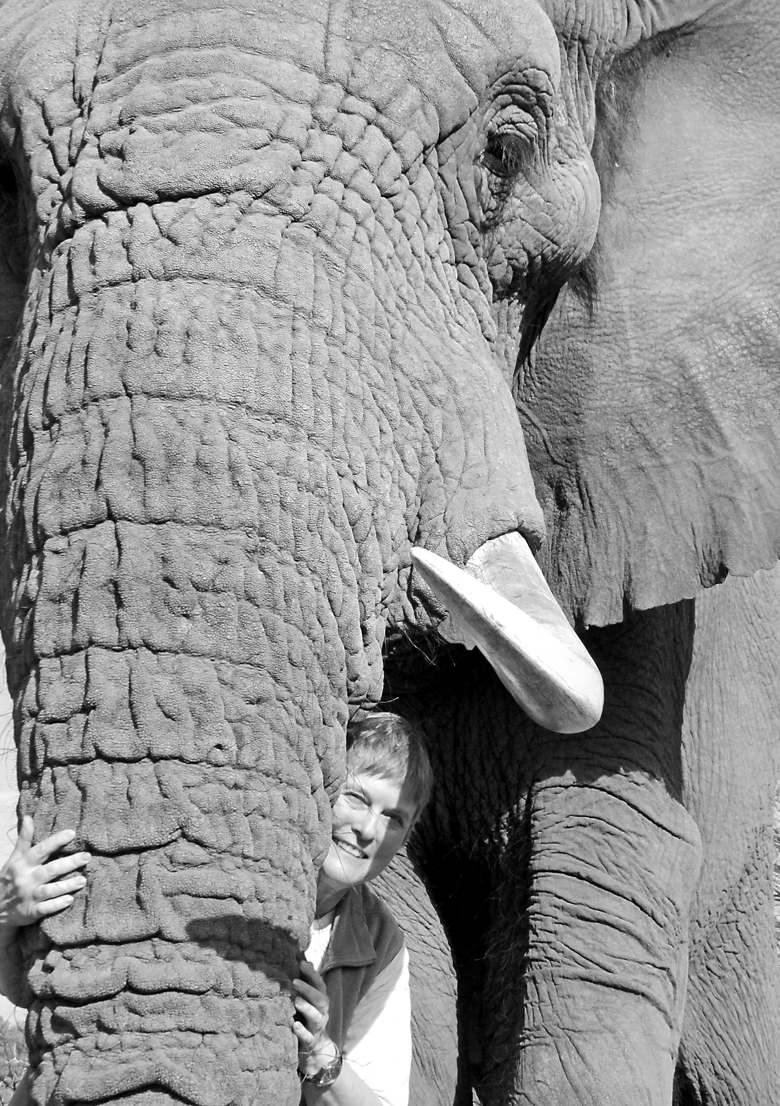PORT ANGELES — How big is an African elephant?
“Jabu is one hundred times larger than I am,” writes Port Townsend author Cheryl Merrill.
“His trunk is larger than I am. A single leg is larger than I am.”
Twenty years ago, Merrill met her first African elephants. Fascinated by the threatened beasts, she determined to learn all she could, visit whenever she could and write about them.
Larger than life
She returned to Botswana with camera and notebook, and is close to completion of her book Larger than Life: Living in the Shadows of Elephants.
This Tuesday, Merrill will share her photographs and read from her book-in-progress at the Port Angeles Library.
Admission is free at the 7 p.m. gathering in the Raymond Carver Room at the library, 2210 S. Peabody St.
The Okavango Delta, Botswana’s vast grassland, is a long way from the peach orchards of Eastern Washington where Merrill grew up.
She picked peaches every summer in her grandparents’ orchard, earning enough to put herself through the University of Washington.
Since childhood, she had been reading her grandmother’s National Geographic magazines, dreaming of a trip to Africa.
She especially wanted to see lions in their natural environment, but such travel seemed out of reach.
Merrill found early success as a poet and essayist; her chapbook of poems, Cheat Grass, was published by Copper Canyon Press in 1975, and her poems were published in Northwest Review, Paintbrush, Willow Springs and other literary journals.
However, she had to put her writing career on hold to take care of her aging father and ill sister-in-law.
The dream of Africa, too, was put on hold.
When her grandmother died and bequeathed her some money, Merrill sought to fulfill that dream.
In 1996, she went on a tour of southern Africa with a small group of friends.
Although she only caught a glimpse of a lion, which quickly retreated into the bush, an encounter with elephants became the highlight of the trip.
Herd of elephants
At dusk at a waterhole somewhere in Botswana, the group found their tour jeep surrounded by a herd of elephants — perhaps 60 of them.
The elephants were heading peacefully to the waterhole to drink.
“They were so considerate,” Merrill recalled, “walking slowly by us as if they were window shopping. We were just part of the herd.”
When she returned home, Merrill read all she could about elephants and saved money to take a second trip.
In her research, she learned of a couple in Botswana, Doug and Sandi Groves, who have established the Living With Elephants Foundation and whose life’s work is to make wildlife “safari” tours more humane.
The Groves adopted a trio of elephants orphaned in the culling operations now banned by most governments.
The couple then decided their elephants would not be asked to take riders on their backs and would not be “disciplined” or beaten.
Instead, guests would walk with the elephants and see them live their daily lives in the bush.
The Groves invited Merrill to visit their bush camp in the Okavango Delta.
Their herd of three elephants — Jabu, Morula, and Thembi — became the focus of her study.
She has now spent several weeks in Botswana over some years, roughing it in a canvas tent in the bush a short Cessna plane ride from the small town of Maun.
She has grown to love and understand the African landscape and the elephants.
Merrill’s publications include photo essays about elephants in Iron Horse Literary Review and the Drexel Online Journal, and a photo essay forthcoming in Brief Encounters, an anthology of short fiction to be published by W.W. Norton in 2015.
Her essay “Trunk” was chosen for a Special Mention in the Pushcart Prize XXXII Best of the Small Presses 2008 anthology.
For more information about Tuesday’s reading and the North Coast Writers, email Molly Hollenbach at mollyh@hevanet.com or phone Suzann Bick at 360-797-1245.
________
Features Editor Diane Urbani de la Paz can be reached at 360-452-2345, ext. 5062, or at diane.urbani@peninsuladailynews.com.

